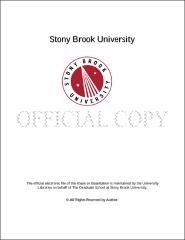| dc.identifier.uri | http://hdl.handle.net/11401/77598 | |
| dc.description.sponsorship | This work is sponsored by the Stony Brook University Graduate School in compliance with the requirements for completion of degree. | en_US |
| dc.format | Monograph | |
| dc.format.medium | Electronic Resource | en_US |
| dc.language.iso | en_US | |
| dc.publisher | The Graduate School, Stony Brook University: Stony Brook, NY. | |
| dc.type | Dissertation | |
| dcterms.abstract | Previous work has shown that different discrete emotional states (e.g. anger) affect cognitive processing differently. Anger has been associated with simplifying cognition to promote rapid action-related processes. For example, anger promotes an increased tendency to rely on preexisting cognitive biases. Such a processing style may have been advantageous in evolutionary history, but it can also lead to increased memory errors. The present study examined the simplifying effects of anger on memorial processing, using three different misinformation paradigms. The first experiment, using a classic three-phase misinformation paradigm, showed that anger directly affects memory performance and that anger increases acceptance of misinformation in situations involving both memory suppression and updating. Experiment 2 expanded upon this finding, suggesting that anger may specifically impair one's ability to suppress false information that is later retracted. Finally, Experiment 3 presented a potential boundary condition for the effects of anger on memory. Anger did not affect participants' metamemorial responses after false feedback, nor did anger lead people to alter their interpretation of ambiguous feedback. Together, these experiments showed that angry people may be more susceptible to misinformation effects than non-angry people. They also provide evidence that anger may alter memorial processing in this manner because people tend to engage in simpler forms of processing when angry. Therefore, this has implications for both an understanding of memory and real-world application. | |
| dcterms.available | 2017-09-20T16:52:57Z | |
| dcterms.contributor | Franklin, Nancy | en_US |
| dcterms.contributor | Luhmann, Christian | en_US |
| dcterms.contributor | Monhanty, Aprajita | en_US |
| dcterms.contributor | Connell, Paul. | en_US |
| dcterms.creator | Greenstein, Michael J. | |
| dcterms.dateAccepted | 2017-09-20T16:52:57Z | |
| dcterms.dateSubmitted | 2017-09-20T16:52:57Z | |
| dcterms.description | Department of Experimental Psychology. | en_US |
| dcterms.extent | 112 pg. | en_US |
| dcterms.format | Monograph | |
| dcterms.format | Application/PDF | en_US |
| dcterms.identifier | http://hdl.handle.net/11401/77598 | |
| dcterms.issued | 2013-12-01 | |
| dcterms.language | en_US | |
| dcterms.provenance | Made available in DSpace on 2017-09-20T16:52:57Z (GMT). No. of bitstreams: 1
Greenstein_grad.sunysb_0771E_11508.pdf: 884503 bytes, checksum: c67a43cadff2304cca66904dbd296e14 (MD5)
Previous issue date: 1 | en |
| dcterms.publisher | The Graduate School, Stony Brook University: Stony Brook, NY. | |
| dcterms.subject | anger, emotion, false memory, judgment, memory, testimony | |
| dcterms.subject | Cognitive psychology | |
| dcterms.title | Anger and memory: Misleading people is easy when they are mad | |
| dcterms.type | Dissertation | |

